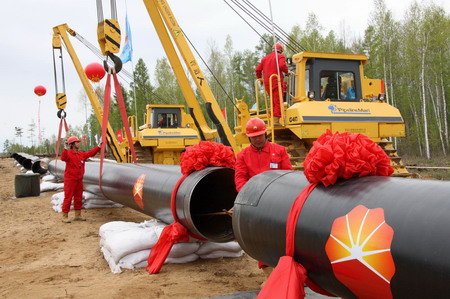Remarkable Achievements in 60 Years: Underpinnings of Rapid Economic Growth
IV. Proactively Seek International Energy Cooperation under the Principles of Equality, Reciprocity and Mutual Benefits
Before the reform and opening up, China adopted a self-sufficient energy supply system. After the reform and opening up policy was introduced, China became involved in international energy cooperation, having an increasingly closer tie to global energy in the globalization progress. Now, a global energy market featuring that "China cannot go without the world; the world cannot go without China" has been created.
China always sticks to the principles of equality, reciprocity and mutual benefits in bilateral, multilateral energy talks and extensive energy diplomacy. To date, China has established a bilateral cooperation mechanism with 36 countries and regions including the United States and Russia, participated in 22 international energy organizations including APEC and ASEAN+3 as well as multilateral mechanism, and held China-ASEAN energy cooperation workshops and five-country energy ministers meetings, attracting wide attention in the intentional community. These talks and communications have helped promote China's energy policy, demonstrate its energy achievements, enhance mutual understanding, and create a good international atmosphere for energy development.
China is actively involved in international energy cooperation. It has cooperated with over 40 countries and regions in exploration, development, refining chemicals and piping. In particular, breakthroughs have been made in international energy cooperation since 2008. China and Russia entered into a package of cooperation agreements on construction of crude oil pipeline, long-term crude oil trading and lending, with pipe works commenced on both sides of the boundary; the phase I China-Kazakstan crude oil pipeline has started to transfer oil, the phase II China-Kazakstan crude oil pipeline project and the trans-Asia natural gas pipeline project will be completed in 2009 and 2010, respectively; China and Burma entered into an inter-governmental agreement on construction of crude oil and natural gas pipelines; China also signed a package of loan-for-oil agreements with Venezuela and Brazil. The four strategic oil import channels (Northwest, Southwest and Northeast and offshore) have been basically completed; and large overseas oil and gas production bases have been preliminarily created, providing diversified sources of energy supply.
 |
|
Commencement of China-Russia Crude Oil Pipeline Project |
China also plays a constructive role in international energy cooperation, in addition to taking extensive obligations. We will continue to strengthen energy stalks and cooperation under new energy security philosophy of "mutual benefits, diversified development and collaborative assurance, and deliver due contributions to world energy security.
V. Energy System Reform Deepened to Inject Additional Vigor to Energy Development
The energy system reform has been carried out since the birth of the new China 60 years ago, in particular in the 30 years' reform and opening up. The energy industry has made continuous and stable growth to accommodate development of national economy and society.
In early years of reform and opening up, China suffered short energy supply and limited financial resources. Therefore, a series of innovative reforms have been launched in investment system, governmental and market regulation as well as operation and management of state-owed enterprises. Financing of enterprises shifted from grants to lending, energy investors were diversified, enterprises were given more discretion in making business decisions, foreign capital and advanced technologies were introduced, and incentives were offered to private and foreign capitals, thereby involving more parties in energy development and expanding energy production and supply.
Subsequent reforms were focused on creation of the energy industry system suitable for the socialist market economy of China, with the priority placed on further transforming governmental functions, separating government from enterprises, establishing the market-based price mechanism, increasing the role of market in allocation of resources, establishing the modern enterprise system and converting the business operation mechanism. Major reforms include cancelation of energy industry departments and creation of national energy industry companies; introduction of market-based price mechanism, progressive liberalization of coal price, improvement in alignment of oil price to international markets and adjustment of finished oil price; establishment of the modern enterprise system, including overseas listing of some power and oil operations; power system reform, including establishment of the State Electricity Regulatory Commission, two power grid corporations, five power generation groups and four auxiliary service companies; and promotion of renewable energy commercialization. These reforms have provided a strong basis for development of the energy industry and energy supply.
The National Energy Administration was established in March 2008, another milestone in energy development and reform in China. The Administration is responsible for developing strategies, plans, policies and standards for energy development, administrating such industries as electricity, coal, oil, natural gas and new energy, promoting energy conservation in the energy industry, advancing energy technologies and equipments, managing strategic oil reserves of the country, and engaging in international energy cooperation. Its establishment will be set to pose a significant effect on energy development of China. The Administration will hold high the "great banner of socialism with Chinese characteristics, implement the scientific view of development in an in-depth way, transform the mode of development, accelerate energy restructuring and develop clean energy, advance energy technologies and equipments, thereby creating a stable, economical, clean and secure energy supply system and delivering due contributions to economic growth of China and the larger world.
 0
0 







Comments